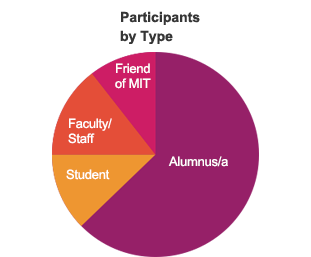Faculty identified nearly 300 courses that could be suitable for EdX/MITx
Students focused on approximately 20 courses that they felt would work in a different format. Most of these overlapped with courses identified by faculty.
Faculty reported on whether a variety of features were present in their classes. The results showed that many MIT classes break out of the lecture format.
Which values and
principles of an MIT education do you feel are most important to maintain or develop?

Students were asked to rate which features of classes they would like to have more or less of. The most popular activities were in-class problem solving and hands-on activities.
- Changes in Spaces
Faculty and students shared many opinions on what spaces would be more useful in the future.
“I would like to incorporate more online materials seamlessly into my lectures; better connectivity in the classrooms is crucial.”– Faculty/Instructor
“More rooms indoors with tables and whiteboards that are clean and nice. More seating areas inside in open spaces where people can work but where people are also allowed to talk (i.e., not a library).”– Student
“Would like touch sensitive large display -- essentially a telestrator to mark up projected powerpoint slides.”– Faculty/Instructor
“Allowing access to MIT classrooms (that are not reserved by faculty) after hours is really nice.”– Student
“Flat rooms with moveable tables.”– Faculty/Instructor
"Lounges for every major / 'hackerspace' with cool technologies like a LeapMotion, KINECT, myo, Oculus rift etc where students from different disciplines can collaborate. Similar to Harvard's i-lab, but more casual than the Martin trust center.”– Student
“More teal like rooms, if we never build another large lecture hall, that is too soon.”– Faculty/Instructor
“More large conference rooms, preferably mostly soundproof, as opposed to those in the 5th floor of the student center.”– Student
“For hands-on classes, it's necessary to have space where students can work on projects, leave them between work sessions, etc.”– Faculty/Instructor
“Can we have a more inviting coffee shop? Some people like very silent workspaces, others need some festivity to the environment.”– Student
Common faculty suggestions:
- Videoconferencing
- Student Response Systems
- E-books
- Lecture Capture

- Faculty-Student Interaction
Faculty and students suggested many ways to increase quantity and quality of interaction.
“Building things together -- I would love to make robots or machine things with faculty and other students”– Student
“Give the faculty dinner passes to the dorm dining halls. Or give more guest passes to the students if they invite faculty members.”– Faculty/Instructor
“sponsor faculty seminars for mostly-student audience in each department. food / drink after the talk will help in socializing. Maybe have 2-3 faculty present brief talks.”– Student
“Give junior faculty (and maybe also senior faculty) free passes to MIT Athletic Center. It will encourage the faculty to play intramurals with the students, and to interact with the students in a more relaxed setting."– Faculty/Instructor
“Bar nights with faculty”– Student
“Faculty "advisors" should not be reviewing and approving student schedules. That can be better done by well-trained administrators that know the Institute and Departmental requirements. "– Faculty/Instructor
“Faculty offer short-term projects to interested students (not just UROP) related to their work during summer or IAP”– Student
“Freshman advising seminars with more upperclassmen/grad student support ... topic of personal interest to faculty. Project based.”– Faculty/Instructor
“Encourage faculty to have official 'student-time' slots when students can pop in at any time to talk.”– Student
“Provide common spaces where people would feel relaxed. The main reason for lack of spontaneous interaction is an environment that provides no opportunity to relax"– Faculty/Instructor
“have shared spaces for graduate students and professors in departments for heating up food, getting hot water, etc”– Student
“Have large teams of faculty attached to living groups, instead of just house masters. Let the house masters be more like "department heads", not one man shows. "– Faculty/Instructor
- Flexibility
Many faculty were interested in increasing flexibility in degree programs and their requirements.
"I wish we gave our students a better balance of independent and guided learning (pushing more towards independence than our current state)." – Faculty/Instructor
"Core curricula for undergraduate degrees should have greater freedom: I'd suggest at least four courses reasonably related to degree area but not restricted by departmental boundaries/fiats for any major."– Faculty/Instructor
"Increase engineering degree offerings (let students create their class plan to be approved by their advisor)"– Faculty/Instructor
"Permit wider peripheral-learning in fields that are not part of the major" – Faculty/Instructor
"Less restricting GIRs, more freedom in exploring subjects, including environmental, social, policy subjects"– Faculty/Instructor
"Provide greater flexibility as to course requirements and humanity requirements. Let the student define more of his/her path through MIT with self-imposed rigor rather than rigid requirements. "– Faculty/Instructor

Preferences for skill development varied significantly across types of students
Faculty reported on whether the classes they taught had field experiences and, if not, whether the classes would benefit from the addition of this feature.
"These responses varied significantly across schools."

Many participants discussed the component of the MIT experience that emerged from living in the middle of MIT’s unique campus and community.
- Promote greater faculty-student interaction on campus to offset online education
- Actively promote group project and pset work via expansion of group spaces
- Reduce or adjust MIT's physical footprint to reflect a more online experience
- Integrate living spaces with learning spaces, learn/work in small groups

Respondents explored a number of ways to reduce costs and increase revenue streams with a focus on reducing the debt burden on students.
- Offer a cheaper 3 year degree with stripped-down GIRs
- Integrate industry partners into classes across departments
- Allow students to pay for tuition with a percentage of their future salary
- Improve transparency in financial aid
None
Participants explored the many possible uses for the new online platform, proposing creative new paths and unique perspectives on existing models of education.
- Use online lectures to supplement, not replace, future residential classes
- Give credit for online education
- Create online courses for high school seniors to prepare them for college
- Develop new pedagogy for online classrooms
- Integrate new pedagogical advances made possible by web technology
- Add online components to residential classes
- Promote greater faculty-student interaction on campus to offset online education
- Offer a cheaper 3 year degree with stripped-down GIRs
- Focus content to be more applied and connected to the real world
- Make education a mix of online and residential classes
- Offer versions of courses to fit different learning styles
- Integrate industry partners into classes across departments
- Give credit for online classes
- Create online courses to prepare high school seniors for college
Contributors emphasized the need for MIT to continue to be a leader in providing high-quality, accessible content to knowledge-seekers around the world.
- Use MIT's influence to promote conversation on science and technology worldwide
- Involve MIT in school-based or nonprofit outreach projects
- Create EdX "satellite" campuses
- Encourage online collaboration in MOOCs by teams in different countries


